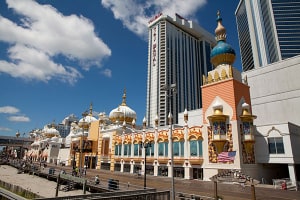
The more-than-a-month-long workers strike was cited as one of the main reasons for the tough decision made by officials for the hotel and casino complex. Although the fact that the casino venue that has formerly been considered one of the centerpieces of the once-popular gambling destination will no longer welcome visitors from around the world may strike as somewhat surreal at first, its closure is not exactly coming out of the blue.
Trump Taj Mahal has been posting revenue and profit drops for quite some time now. According to figures reported by the New Jersey Division of Gaming Enforcement, the hotel and casino complex generated revenue of $85.2 million during the first half of 2016, down 3.6% from the same period of the previous year.
In 2014, four Atlantic City casinos closed doors and Trump Taj Mahal barely escaped the same fate. New York business magnate Carl Icahn purchased the struggling venue last spring. At that time, the billionaire investor owned the casino’s $292-million debt and had it traded in exchange for ownership of the gambling property. Mr. Icahn said back then that he planned to invest $100 million in Trump Taj Mahal in order to bring back its former luster. It all shows that now, a year later, the casino has not improved its profitability.
In June, workers at five of Atlantic City’s eight operational gambling venues, threatened that they would walk out during the July 4 holiday weekend, if they were not offered agreeable health benefit and pension plans by casino owners. Employees at four of the casinos agreed on new contract terms with their employers. It was only Trump Taj Mahal that could not negotiate what its workers considered acceptable terms. This resulted in the longest casino workers’ strike to have taken place since casino gambling was first introduced in Atlantic City.
Around 1,000 housekeepers, servers, cooks, and bellmen working at the hotel and casino complex (excluding workers at the casino itself) have been picketing it since July 1, seeking restoration of the health benefits and pension plans they gave up in 2014 when the resort’s bankruptcy proceedings were initiated.
Commenting on the announcement about the upcoming closure, Tony Rodio, CEO and President of Tropicana Entertainment Inc., an Atlantic City-based casino company owned by Mr. Icahn, said that with Trump Taj Mahal monthly losing millions of dollars and the workers’ strike closing any path to profitability, the hotel and casino complex had no other options left but to close its doors.
Shortly after news about the closure spread, Bob McDevitt, President of UNITE HERE Local 54, the labor union supporting the strike, issued a statement on the matter, saying that for “a few million bucks” Mr. Icahn would have appeased workers but he has decided to slam the door to people who have worked at the property for more than two decades just to punish them and to break their strike.
Mr. McDevitt likened the billionaire investor to a playground bully who would pick up his ball and would declare he was going home just because no one wanted to play his way. The UNITE HERE Local 54 President and Mr. Icahn have been exchanging sharp words since the latter bought Trump Taj Mahal. Their conflict has understandably been centered around the businessman’s continued refusal to restore the benefits workers had formerly given up.
Trump Taj Mahal opened doors in 1990 by Republican Party presidential candidate Donald Trump. Although the hotel and casino complex still bears his name, Mr. Trump has not been involved in its operations for years now.















